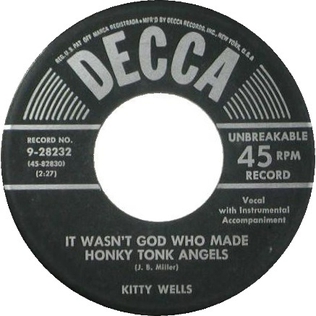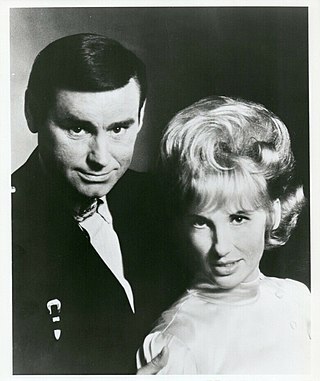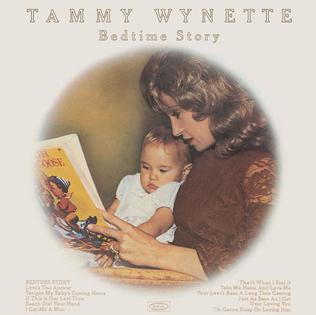
Tammy Wynette was an American country music singer and songwriter, considered among the genre's most influential and successful artists. Along with Loretta Lynn, Wynette helped bring a woman's perspective to the male-dominated country music field that helped other women find representation in the genre. Her characteristic vocal delivery has been acclaimed by critics, journalists and writers for conveying unique emotion. Twenty of her singles topped the Billboard country chart during her career. Her signature song "Stand by Your Man" received both acclaim and criticism for its portrayal of women's loyalty towards their husbands.

"It Wasn't God Who Made Honky Tonk Angels" is a 1952 country song written by J. D. "Jay" Miller, and recorded by Kitty Wells. It was an answer song to the Hank Thompson hit "The Wild Side of Life". First performed by Al Montgomery as "Did God Make Honky Tonk Angels" on the Feature label which was owned by songwriter J.D. Miller.

"Stand by Your Man" is a song recorded by the American country music artist Tammy Wynette, co-written by Wynette and Billy Sherrill. It was released on September 20, 1968, as the first single and title track from the album Stand by Your Man. It proved to be the most successful record of Wynette's career, and is one of the most familiar songs in country music. The song was placed at number one on CMT's list of the Top 100 Country Music Songs.
"D.I.V.O.R.C.E." is a 1975 UK number-one single by Scottish folk singer and comedian Billy Connolly. A comedy song, it reached No. 1 for one week in November 1975, and was one of the few songs of its genre to reach this milestone.
"Sweet Dreams" or "Sweet Dreams (of You)" is a country ballad, which was written by Don Gibson. Gibson originally recorded the song in 1955; his version hit the top ten of Billboard's country chart, but was eclipsed by the success of a competing recording by Faron Young. In 1960, after Gibson had established himself as a country music superstar, he released a new take as a single. This version also charted in the top ten on the country chart and also crossed over to the Billboard Hot 100, where it peaked at No.93. The song has become a country standard, with other notable versions by Patsy Cline and Emmylou Harris.

The Grand Tour is an album by the American country music artist George Jones, released in 1974 as his fifth album for Epic Records. It peaked at #11 on the Billboard Country Albums chart and contained the hit title track, which reached a peak of #1 in August 1974. It is Jones’ 50th Album Release.
"The Grand Tour" is a song made famous by country music singer George Jones. Originally released in 1974, the song was the title track to his album released that year. The song became Jones' sixth No. 1 song on Billboard's Hot Country Singles chart in August 1974, and was the fourth-biggest hit of the year. In 2014, Rolling Stone named the song number 38 on its "40 Saddest Country Songs of All Time".
"We Must Have Been Out Of Our Minds" is a song made famous as a duet by country music singers George Jones and Melba Montgomery. Originally released in 1963, the song became a Top 5 hit on the Billboard Hot Country Singles chart and a country music standard.

D-I-V-O-R-C-E is a studio album by American country artist Tammy Wynette. It was released in July 1968 via Epic Records and contained 11 tracks. Several recordings were cover tunes, including songs by Merle Haggard and The Beatles. Several new selections were also part of the collection, including the title track. Released as a single, the title track became Wynette's fourth number one song on the North American country charts in 1968. The album itself would also top the American country LP's chart in 1968. D-I-V-O-R-C-E received positive reviews from critics following its release.

The discography of American country artists George Jones and Tammy Wynette contains the recordings they made as a vocal duo. Their discography includes nine studio albums, 14 compilation albums, 15 singles and one music video. In October 1971, the duo's first studio album was released by Epic Records and was titled We Go Together. It peaked at number three on the American Billboard Top Country Albums chart and number 169 on the Billboard 200 list. Included on the disc was the duo's first single, "Take Me". It reached the top ten on the American Billboard Hot Country Songs chart and the top 20 on the Canadian RPM Country Tracks chart. It was followed by their second studio album called Me and the First Lady, which charted at number six on the Billboard country list. Featured on the disc was their second top ten single, "The Ceremony".
"Lonely Street" is a 1956 song written by Carl Belew, Kenny Sowder, and W.S. Stevenson, originally performed by Belew, and later by Dave Rich.

Stand by Your Man is a studio album by American country artist Tammy Wynette. It was released in January 1969 via Epic Records and contained 11 tracks. It was the fifth studio album of Wynette's career and was named for its title track. The title track became Wynette's signature song and most successful single of her career.

The Ways to Love a Man is a studio album by American country artist, Tammy Wynette. It was released on January 26, 1970, via Epic Records and was the seventh studio album in Wynette's career. The disc consisted of 11 tracks which included both original material and cover recordings. Its title track was the album's only single included. It became a number one song on the North American country charts while also reaching chart positions in other musical genres as well. The album itself also reached chart positions on the country albums chart following its release. Critics and journalists gave the album a positive reception in the years that followed.

Bedtime Story is a studio album by American country artist, Tammy Wynette. It was released in March 1972 via Epic Records and contained 11 tracks. The disc featured both new recordings and cover tunes. Two singles were included: title track and "Reach Out Your Hand". Both made top positions on the North American country charts in 1972. The album itself reached the top ten of the American country albums chart following its release.

The singles discography of American country musician Tammy Wynette contains 65 singles, 6 music videos, 3 promotional singles and 2 featured singles. Wynette signed with Epic Records in 1966 and her debut single "Apartment No. 9" was released the same year. Her single "Your Good Girl's Gonna Go Bad" (1967) became a major hit, reaching number 3 on the Billboard Hot Country Singles chart. Its follow-up singles: "My Elusive Dreams", "I Don't Wanna Play House", "Take Me to Your World" and "D-I-V-O-R-C-E", became number 1 hits on the Hot Country Singles chart.

The albums discography of American country music artist Tammy Wynette contains 33 studio albums, 55 compilation albums, 2 box sets and has appeared on 6 additional albums. In 1966, Wynette signed a recording contract with Epic Records. The following year, her debut studio album entitled Your Good Girl's Gonna Go Bad was issued, peaking at number 7 on the Billboard Country Albums chart. The same year, she collaborated with David Houston on the studio album My Elusive Dreams, which reached number 11 on the same chart. The following year, her fourth studio album D-I-V-O-R-C-E peaked at number 1 on the Country Albums list, spending two weeks at the top spot. Wynette's fifth studio record Stand by Your Man (1969) reached number 2 on the country albums chart and peaked at number 43 on the Billboard 200 albums list. Wynette's first compilation released entitled Tammy's Greatest Hits (1969) would spend 61 weeks on the Billboard 200 before peaking at number 37.
"(You Make Me Want to Be a) Mother" is a song written by Billy Sherrill and Norro Wilson, and recorded by American country music artist Tammy Wynette. It was released in January 1975 as a single from her compilation album Tammy's Greatest Hits, Vol. 3.

Tammy's Greatest Hits, Volume II is a compilation album by American country artist, Tammy Wynette. It was released on September 6, 1971 via Epic Records and featured 11 tracks. A majority of the album compiled previously-released singles from the late sixties and early seventies. Some tracks were new material, including "Good Lovin' ". Released as the disc's lead single, it topped the country charts in 1971. The album itself reached the top five of the American country LP's chart in 1971 and later certified gold in the United States.

Kids Say the Darndest Things is a compilation album by American country artist, Tammy Wynette. It was released on April 23, 1973, via Epic Records and contained 11 tracks. The disc was a concept album centering around children and domestic life. The title track was the lead single from the album and topped the country charts in 1973. The album itself also made the American country albums chart. It received positive reviews from critics.

"Will Your Lawyer Talk To God" is a song written by Harlan Howard and Richard Johnson, sung by Kitty Wells, and released on the Decca label. In September 1962, it peaked at No. 8 on Billboard's country and western juke box chart. It spent 11 weeks on the chart.














